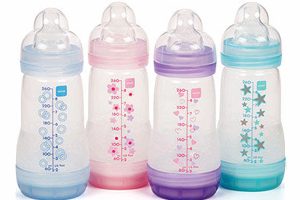
Baby Bottle Makers Under Tight Scrutiny. On the heels of Suffolk County’s announcement this week that legislative officials there voted to implement a bill to ban the controversial, toxic chemical Bisphenol A (BPA) from baby bottles and sippy cups, MSNBC is reporting that Connecticut’s attorney general, Richard Blumenthal, made another announcement regarding the toxin. According to […]

Baby Bottle Makers Under Tight Scrutiny. On the heels of Suffolk County’s announcement this week that legislative officials there voted to implement a bill to ban the controversial, toxic chemical Bisphenol A (BPA) from baby bottles and sippy cups, MSNBC is reporting that Connecticut’s attorney general, Richard Blumenthal, made another announcement regarding the toxin.
According to Blumenthal, six companies have agreed to stop making baby bottles containing BPA, said MSNBC, which added that attorneys general from Connecticut, Delaware, and New Jersey sent letters late last year to 11 companies, urging them to stop using the dangerous chemical. Avent, Disney First Years, Gerber, Dr. Brown, Playtex, and Evenflow responded and have already stopped production of baby bottles containing BPA, Blumenthal said, according to the MSNBC report.
But, despite these steps and despite overwhelming evidence presented by a wide array of experts saying that BPA is dangerous, the Food & Drug Administration (FDA) continues to maintain that current BPA exposure levels do not pose an immediate health risk to the general population, including infants and young children. Worse, it is widely known that the agency relied solely on two industry-funded studies for its information, something for which it has long been criticized. In a prior report, the Associated Press (AP) noted that after an independent assessment discovered fractures in the agency’s study, it finally announced late last year it was planning on conducting additional research on the chemical.
BPA is the highly ubiquitous, estrogenic toxin that is present in a large variety of consumer products and which has been found to be harmful to humans, especially to the growing bodies of infants and children. The AP has reported that the problem with BPA and young children is that younger, developing kidneys tend to retain the toxic chemical in their bodies longer than the kidneys of older children and adults, a serious concern since babies are exposed to BPA from formula packaging, baby bottles, sippy cups, and other plastic products, which are geared to the youngest consumers.
BPA has been linked to a variety of diseases including an increased risk of diseases or disorders of the brain, reproductive system, and immune system; problems with liver function testing; diabetes and heart disease; interruptions in chemotherapy treatment; and hormonal disturbances. BPA was also linked to serious health problems based on 130 studies conducted in the past 10 years, the Washington Post reported late last year, and newer research found BPA to have negative effects at “very low doses,” lower than the FDA’s safety standards currently in place.
Meanwhile, if approved, the pending bill in Suffolk County, which passed with a unanimous vote earlier this week, would be the nation’s first such ban on BPA in baby bottles and sippy cups. San Francisco’s board of supervisors implemented a similar ban in 2006, but it was rescinded in 2007 over hopes the state would adopt the ban, said Newsday. Now, California, Oregon, Washington, and Hawaii are considering similar bans and Canada announced its BPA baby bottle ban late last year, said the AP.
The personal injury attorneys at Parker Waichman LLP offer free, no-obligation case evaluations. For more information, fill out our online contact form or call 1-800-YOURLAWYER (1-800-968-7529).


